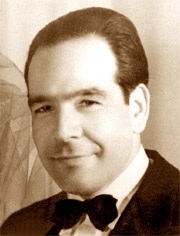Hossein Fatemi
| Hossein Fatemi | |
|---|---|
 |
|
| Minister of Foreign Affairs of Iran | |
|
In office 16 September 1952 – 19 August 1953 |
|
| Monarch | Mohammad Reza Pahlavi |
| Prime Minister | Mohammad Mosaddegh |
| Preceded by | Hossein Navab |
| Succeeded by | Abdol-Hossein Meftah |
| Personal details | |
| Born |
10 February 1917 Nain, Iran |
| Died | 10 November 1954 (aged 37) Tehran, Iran |
| Political party | National Front |
| Spouse(s) | Parivash Sototi (1940-1954) |
| Alma mater | University of Tehran |
| Religion | Shia Islam |
Hossein Fatemi (10 February 1917 - 10 November 1954) was a scholar, journalist, and famous politician of Iran. A close associate of Prime Minister Mohammad Mosaddegh, he proposed nationalization of Iranian oil and gas assets. Initially a journalist, he served as Foreign Affairs Minister of Iran from 1951 to 1953. After the 1953 CIA-orchestrated coup d'état toppled the democratically elected government of Mosaddegh, Fatemi was arrested, tortured, and convicted by a military court of "treason against the Shah", and executed by a firing squad.
Fatemi was born in Nain, Iran on 10 February 1917, the youngest of five. He was educated in his hometown. In his teens he moved to Isfahan for higher education. He was a caustic critic of the Iranian monarch Rezā Shāh, and his views were candidly reflected in his newspaper editorials. From 1944 to 1948 he studied in France, where he earned a bachelor's degree in journalism. There he also received a doctorate degree in law in 1948.
After graduation, Fatemi returned to Iran and became instrumental in launching the daily titled Bākhtar (West) in Isfahan. From its founding in 1949, Fatemi was an active member of the Iranian National Front, the democratic and nationalist movement of Mosaddegh. Later the daily was moved to Tehran and began to be the mouthpiece of the front.
He served as an assistant to the prime minister and as deputy of Tehran in the Iranian parliament. At the age of 33 he was appointed minister of foreign affairs to the Mosaddegh's cabinet in October 1952—the youngest minister of foreign affairs in Iranian history. He replaced Hossein Navab in the post. According to Mosaddegh's memoir, published after Fatemi's death, Fatemi was the initiator of the policy of oil nationalization in Iran.
On 15 February 1952, Fatemi was the target of an unsuccessful assassination by the Islamist group of Fadayan-e Islam, who also had planned to assassinate Mosaddegh. In the shooting attack, Fatemi suffered serious injuries which sidelined him for the next seven or eight months, and left permanent wounds.
...
Wikipedia
